Can Alcohol Sabotage Your Weight Loss After 40?
Losing weight after 40 is already a challenge. It’s like your body decided to hit the brakes without consulting you first.
Your metabolism, which used to hum along nicely, now feels like it’s working on a part-time schedule.
Meanwhile, your hormones seem to have their own agenda, throwing mood swings, cravings, and energy crashes into the mix just to keep things interesting.
And now, to add to the chaos, you find out that alcohol might be another factor holding you back.
So what’s really going on here? Is that well-earned glass of wine or celebratory cocktail sabotaging your progress? It’s frustrating to think that something so small could have such a big impact.
But before you start swearing off happy hours, let’s look at what’s happening beneath the surface and figure out if alcohol is truly the troublemaker here—or just a scapegoat.
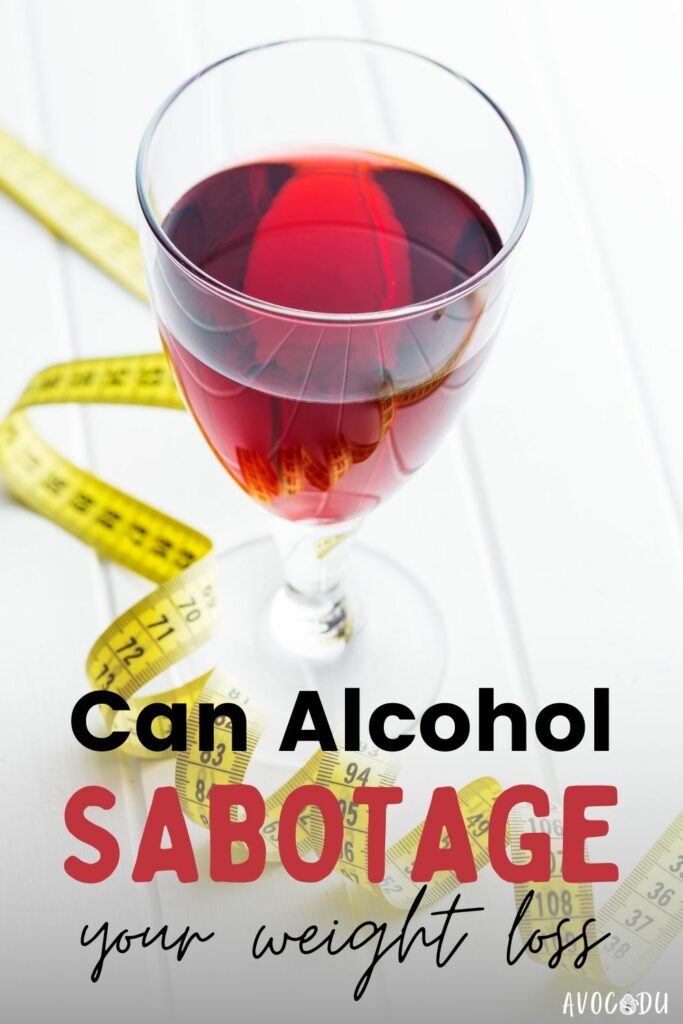
This post may contain affiliate links, which helps keep this content free. Please read our disclosure for more info.
How Your Body Handles Alcohol
When you drink alcohol, your body shifts into a priority mode that might surprise you. Unlike proteins, carbs, or fats, alcohol isn’t something your body can store for later use.
Instead, it processes alcohol immediately, treating it like a toxin that needs to be eliminated as quickly as possible.
Your body says, “Drop everything—we’ve got to deal with this now,” and sets aside every other task on its to-do list.
That means your food digestion and fat burning get benched.
The pasta you had for dinner? Put on hold. That salad you thought was a great choice? Waiting in the wings. All because alcohol is metabolized first, leaving everything else to play the waiting game.
Here’s the kicker: while your body works on metabolizing alcohol, fat burning doesn’t just slow down—it effectively stops.
Your metabolism is too busy dealing with the alcohol to focus on breaking down stored fat or burning the calories from the food you’ve eaten.
So, those calories are left to linger, and they’re not in any hurry to move along. This delay can add up over time, making it harder to see progress on the scale or in how your clothes fit.
The process itself doesn’t work in your favor. When alcohol is metabolized, your body converts it into acetate, a compound it prioritizes for energy. This means your body halts fat burning in favor of dealing with the acetate, creating an obstacle to your weight loss efforts.
That evening drink might feel like a reward, but it’s quietly rerouting your body’s energy system in a way that doesn’t align with your weight loss goals.
So, while it might seem like a harmless indulgence, alcohol is essentially the taskmaster that puts fat burning on hold while it takes over.
And the longer it sticks around, the more those calories from your meal are left to hang out where they aren’t welcome.
Calories That Sneak Up on You
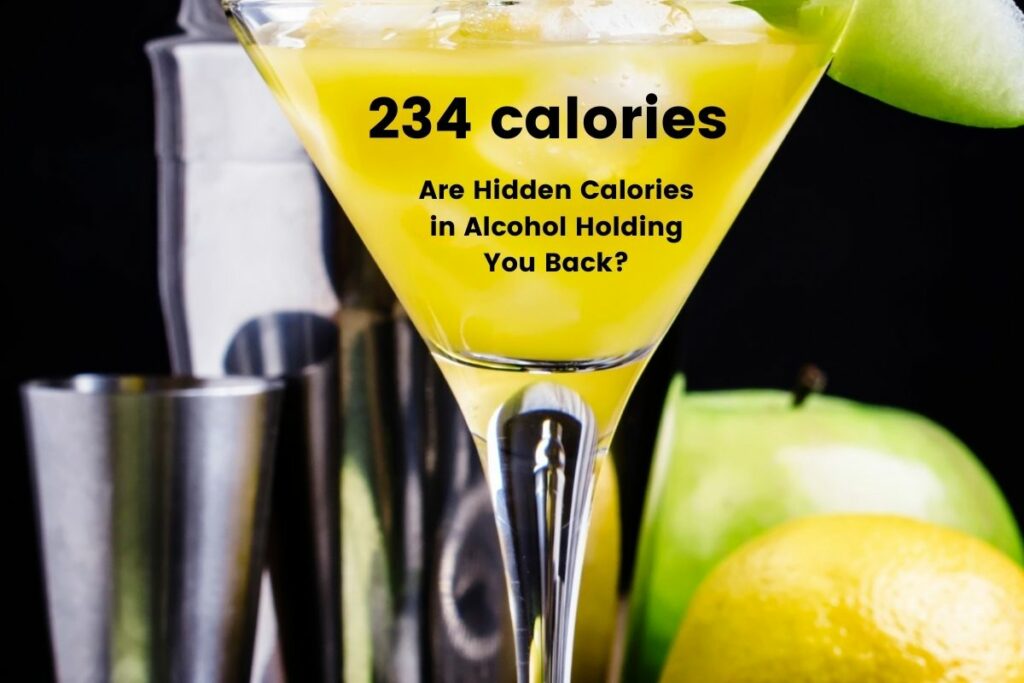
Alcohol has a way of creeping into your calorie count without you even noticing.
That seemingly harmless glass of wine? It’s about 125 calories. Opt for a more elaborate cocktail, and you could be sipping on 300 calories—or more if it’s topped with sugary mixers, syrups, or creamy add-ins.
Now, if you decide to have a second or third drink, it doesn’t take long before you’ve consumed a hefty portion of your daily calorie budget, all without realizing it.
The problem is that alcohol calories are what’s known as “empty calories.” They bring absolutely nothing to the table in terms of nutrition.
No protein to support muscle, no fiber to keep you full, no vitamins or minerals to benefit your body—just pure energy with no payoff.
Unlike a nutrient-packed snack that offers vitamins, protein, or fiber, alcohol provides nothing useful for your body. It’s pure energy with no nutritional value.
Even unhealthy choices like a candy bar at least give you a quick energy boost or satisfy a craving, but alcohol just adds empty calories to your day without offering any redeeming qualities.
And let’s not forget the added calories that often come along for the ride. That drink might lead to ordering appetizers, or you may pair it with a heavy meal, adding another layer of indulgence to the evening.
Even if you think you’re just having a drink or two, the cumulative impact can quickly push your calorie intake way beyond what you had planned.
To make matters worse, these calories don’t even register in the same way as food does. Drinking doesn’t fill you up, so you’re likely to continue eating or drinking without considering the calories you’ve already consumed.
It’s a double whammy: no satiety and an inflated calorie count that can stall your weight loss progress.
Hormones Aren’t Helping
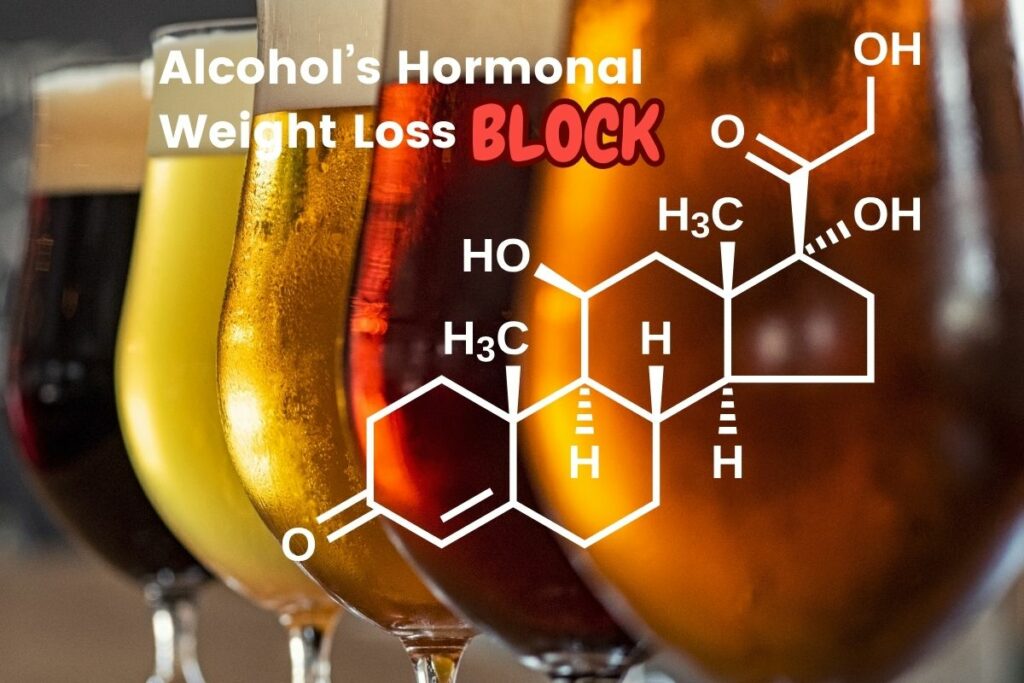
As you get older, hormonal changes can feel like the ultimate curveball. Your body starts operating on a completely different playbook, and weight loss becomes much more challenging than it used to be.
During perimenopause and menopause, estrogen and progesterone levels fluctuate, which can slow down your metabolism and encourage your body to store fat—often around the midsection.
This isn’t just about how your clothes fit; it’s also tied to shifts in how your body processes energy and where it decides to store it.
Then alcohol enters the picture, and it’s not doing you any favors. Alcohol can interfere with your already fluctuating hormone levels, adding yet another layer of complexity.
For instance, it can temporarily increase cortisol, the stress hormone, while also lowering testosterone, which plays a role in maintaining muscle mass and supporting metabolism.
On top of that, alcohol disrupts the balance of insulin, the hormone responsible for regulating blood sugar, which can lead to more cravings and fat storage.
Essentially, your body is already trying to navigate a hormonal rollercoaster, and alcohol is like a disruptive passenger, throwing off the balance even further.
These combined effects make it harder to lose weight and easier to gain it, even if your eating and exercise habits haven’t changed much.
What makes it more frustrating is that alcohol’s impact on hormones isn’t immediately obvious.
You might not feel the effects in the moment, but over time, the disruption to your hormonal balance can create a domino effect—slower metabolism, increased fat storage, and harder-to-manage cravings.
It’s like adding one more hurdle to a race that already feels unfairly stacked against you.
Managing these changes requires understanding how alcohol fits into the bigger picture of your health and making informed choices that work with your body, not against it.
Why Drinking Makes You Hungrier
Alcohol has a funny way of convincing you that eating things you didn’t plan for is the best idea ever.
It’s like the friend who insists, “One more won’t hurt!”—except instead of another drink, it’s that basket of fries or late-night pizza you swore you wouldn’t touch.
Once alcohol enters the equation, your willpower takes a back seat, and your brain gets busy whispering, “Go on, you deserve it.”
But this isn’t just about poor decision-making. Alcohol actually affects the part of your brain that controls appetite.
It lowers your inhibitions and muddles your judgment, making it harder to resist cravings or stick to your usual healthy choices.
What’s worse, alcohol can also trigger hunger by lowering your blood sugar levels. That dip can leave you feeling ravenous, even if you weren’t particularly hungry before you started drinking.
And let’s talk about the types of food alcohol makes you crave. Spoiler alert: it’s rarely a salad or a balanced plate of lean protein and veggies.
Nope, alcohol pushes you toward greasy, salty, carb-heavy options—think nachos, burgers, or chips.
These foods not only pack a calorie punch, but they’re also high in unhealthy fats and refined carbs, which can leave you feeling sluggish and even hungrier later.
It’s not just about the calories from the drinks; it’s the ripple effect they cause. A drink or two can set off a chain reaction: cravings, impulsive choices, and overeating.
Suddenly, a casual evening turns into an unplanned calorie fest that makes your weight loss goals even harder to reach.
How It Messes with Your Sleep
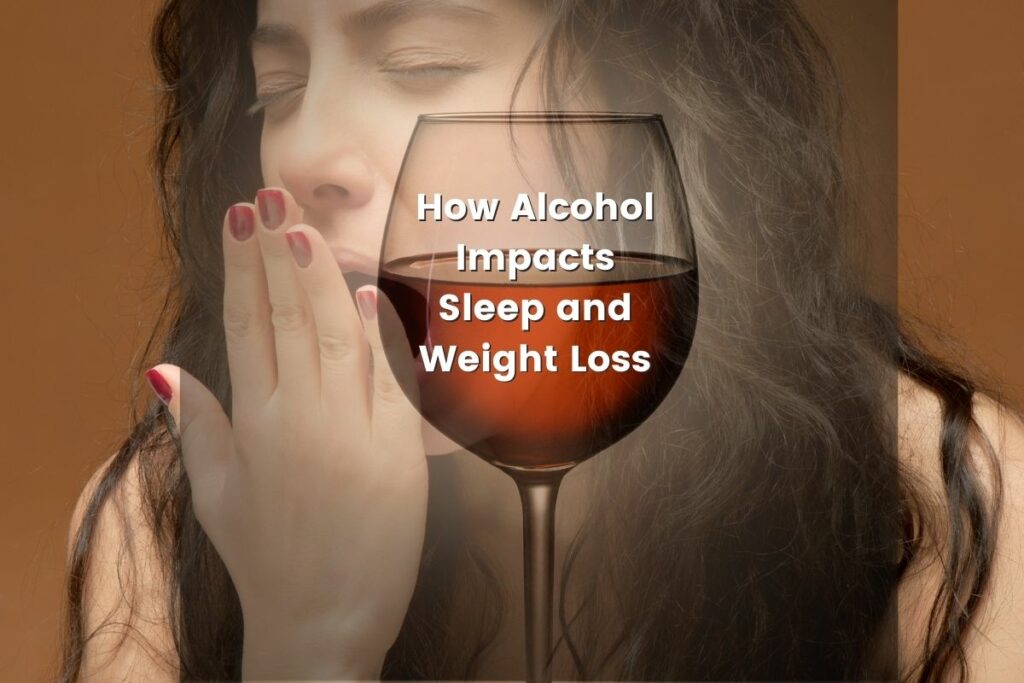
Alcohol can feel like a shortcut to falling asleep. After all, a drink or two might make you feel drowsy and ready to hit the pillow.
But don’t be fooled—it’s not helping you get the restorative rest your body actually needs.
While alcohol can help you fall asleep faster, it disrupts your sleep cycle, especially the deeper stages like REM sleep, which are crucial for both physical and mental recovery.
Instead of waking up refreshed, you’re more likely to feel groggy, irritable, and far from energized. This kind of low-quality sleep has a direct impact on how you feel and function the next day.
And here’s where the trouble really starts: sleep deprivation, even in small doses, throws off your body’s hunger and fullness hormones, ghrelin and leptin.
When these hormones are out of balance, your appetite increases, and your ability to recognize when you’re full decreases.
As a result, that tired feeling often leads to reaching for carb-heavy, sugary snacks that promise quick energy but leave you on a rollercoaster of spikes and crashes.
You’re also less likely to stick to your regular healthy habits—working out can feel like an impossible task when all you want is to crawl back under the covers or make a beeline for the nearest coffee shop for a sugary pick-me-up.
The effects of poor sleep don’t stop there. Chronic sleep disruption can slow down your metabolism, increase stress hormones like cortisol, and make it harder to recover from workouts. It’s a domino effect, starting with that disrupted sleep and snowballing into a day filled with less-than-ideal choices.
So while that evening drink might seem harmless—or even helpful—it’s likely setting you up for a less productive, less energized, and more snack-filled tomorrow.
Consider Trying a 30-Day Break from Alcohol
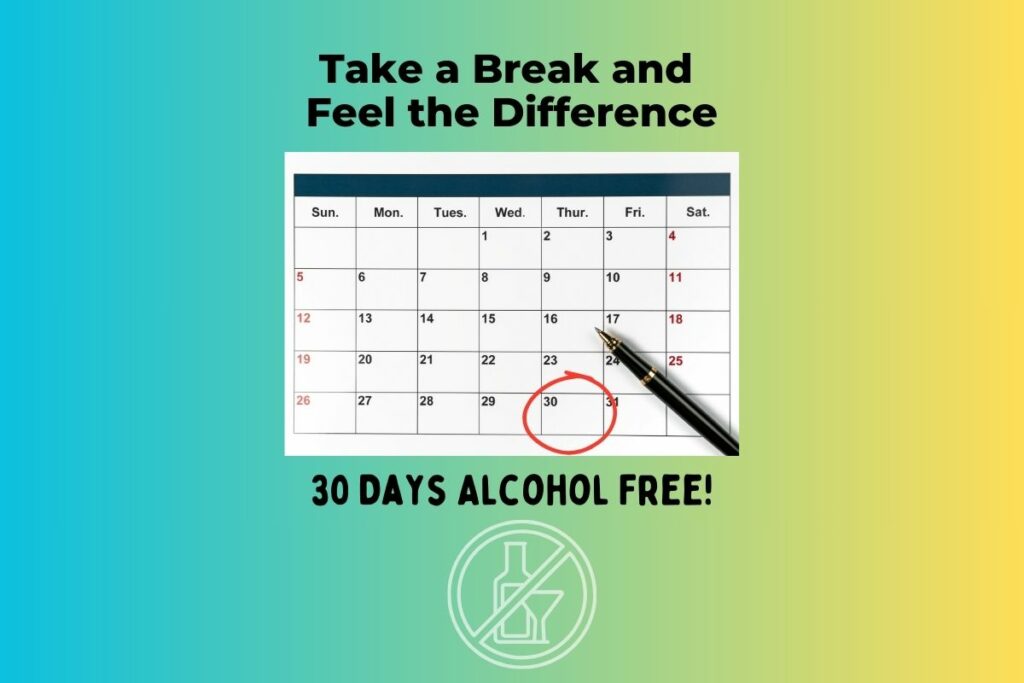
If you’re curious about how alcohol might be affecting your weight loss and overall health, consider taking a 30-day break from drinking. This isn’t about giving it up forever—it’s a short-term experiment to see how you feel without it.
Many people report better sleep, more energy, and improved focus during a month of abstaining. You might notice fewer cravings, better digestion, or even some progress with your weight loss goals. It’s also a great way to reset your habits and evaluate your relationship with alcohol.
At the end of the 30 days, you can decide how (or if) you want to reintroduce alcohol into your routine. The insights you gain could help you make more mindful choices moving forward. It’s not about perfection; it’s about understanding what works best for your body and your goals.
How to Keep Alcohol Under Control to Minimize the Damage
If the thought of giving up alcohol entirely feels daunting, don’t stress. You don’t have to go cold turkey to maintain your health and weight loss goals.
Here are some practical strategies to help you enjoy alcohol without derailing your progress:
- Choose Lower-Calorie Options: Not all drinks are created equal. Opt for beverages like dry wine, light beer, or a simple mixed drink with soda water and lime. Skip the sugary cocktails loaded with syrups and mixers
- Set a Limit: Decide ahead of time how many drinks you’ll have, and stick to it. Enjoy one drink, sip it slowly, and savor it. This helps you stay in control and avoid the temptation to keep refilling your glass.
- Pace Yourself with Water: Alternate each alcoholic drink with a glass of water. This not only slows down your alcohol consumption but also helps you stay hydrated, which can minimize some of the unpleasant side effects like headaches and fatigue.
- Eat Before You Drink: Drinking on an empty stomach can intensify alcohol’s effects, making it harder to make good choices later. A balanced meal with protein, healthy fats, and fiber before you drink can stabilize your blood sugar and reduce the likelihood of overeating or indulging in unhealthy snacks.
- Reassess How Often You Drink: If having a drink has become a daily habit, consider scaling back to weekends or special occasions. Cutting back on frequency can significantly reduce the cumulative calories and other negative effects over time, without making you feel like you’re missing out.
- Switch Up Your Social Habits: If drinking is a big part of your social routine, find alternatives that don’t revolve around alcohol. Suggest activities like coffee meetups, outdoor walks, or even mocktail nights. You’ll still enjoy the company without feeling the pressure to drink.
- Be Mindful of Your Triggers: Pay attention to what makes you reach for a drink. Is it stress, boredom, or social pressure? Identifying the cause can help you find healthier alternatives, like meditation, exercise, or spending time with friends in non-drinking settings.
By implementing these tips, you can enjoy the occasional drink without sacrificing your goals.
Small, thoughtful changes can make a big difference over time, helping you stay on track without feeling deprived.
The Bottom Line
Alcohol can make weight loss harder, especially as your body changes after 40. The occasional drink isn’t going to completely derail your progress, but keeping alcohol in check is essential if you want to see real results.
If you’re ready to take control and make a commitment to your health, the 21-Day Fat Loss Challenge is the perfect next step.

This program provides a clear, structured plan to help you reset your habits, jumpstart your metabolism, and see noticeable results in just three weeks.
During the challenge, you’ll also commit to abstaining from alcohol for 21 days, giving your body the chance to fully focus on fat loss and recovery without the added obstacles alcohol can bring.
This isn’t just about saying no to drinks—it’s about saying yes to your goals. By removing alcohol from the equation for three weeks, you’ll give yourself a chance to experience better sleep, improved energy, and a clearer path to success.
Plus, you’ll have the guidance and tools to stay on track with your nutrition and fitness, making this the ideal opportunity to see what your body is truly capable of.
Ready to take on the challenge and make those 21 days count? Join the 21-Day Fat Loss Challenge here and give yourself the chance to feel healthier, stronger, and more confident in your ability to reach your goals.
This is your time to prioritize yourself and see what a focused, intentional effort can achieve!
